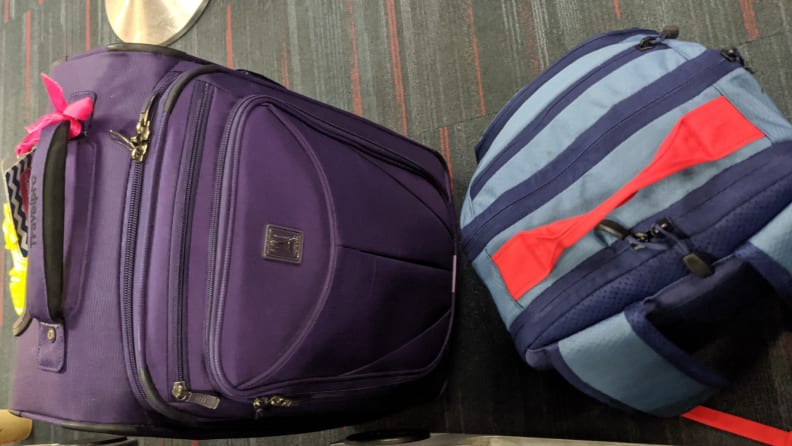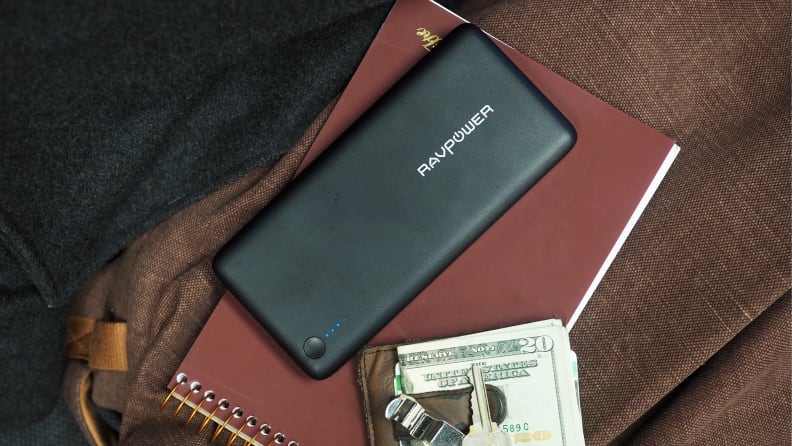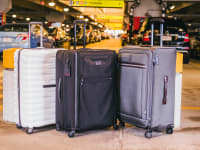6 things I learned about traveling after getting the COVID vaccine
I got my shots and booked a trip. Let's just say some things have changed since March 2020.
 Credit:
Reviewed / Amy Roberts
Credit:
Reviewed / Amy Roberts
Products are chosen independently by our editors. Purchases made through our links may earn us a commission.
In November 2019, I moved to St. Croix in the U.S. Virgin Islands after 17 years in New York City. While my relocation was well timed before the pandemic lockdown, I can think of one big drawback: Being on an island measuring 84 square miles can feel isolating, especially when your family resides about 1,800 miles away. So after I was vaccinated—as were most of the adults in my immediate family—I decided it would be “safe” to travel to the Northeast for my nephew’s third birthday.
In the process, I flew on two planes each direction, rented a car, took trains, and had an (unplanned) overnight stay in a hotel. Along the way, I learned a thing or two—or six—about traveling in a still-dealing-with-COVID world. Here’s what you can do to make your next trip go a little more smoothly, whenever that may be.
1. Bring your own hygiene supplies

I love my new RBG-themed face mask—thanks, Mom!—but I wish I brought a few extra face coverings on my trip.
Even though I have those sweet, sweet vaccine-induced antibodies coursing through my bloodstream, I wanted to be extra-precautious about exposing myself to the coronavirus, or anything else. (Remember when we used to just complain about catching a cold from being on a plane?)
Masks: It goes without saying that masks are de rigueur when traveling pretty much anywhere outside your front door, let alone across the country. Per an executive order, the TSA requires that face coverings fit snugly around the nose and chin, and outlaws ones with valves as well as gaiters and bandanas because they don’t hug the face. (Face shields and goggles are fine as extras, but they don’t replace masks.) I brought two fabric face masks, knowing that my mom had sewn me a new one and I’d be able to do laundry while at her house. Still, I should have brought a few more—on my return trip, all my masks needed a good washing and I really wished I’d saved a clean one for the 10 hours of travel to get home. (The maskne is real.)

I thoroughly sanitized my seats before I sat down ... and waited out the delay on the runway (far right).
Disinfecting wipes: These do double duty for travel, as you can use them to de-germ your plane or train seat and other public touch points as well as sanitize your smartphone. Packets of disinfecting wipes are pricey and still tough to find on my island, so I packed a quart-sized baggie of homemade ones: separated, folded Bounty paper towels that I soaked in Lysol—with a generous pour, you can make these wetter than any pre-packaged ones I’ve found, and therefore better at killing germs.
I thought I had plenty for rubbing down all the seats, tray tables, armrests, and seat belts I would encounter. But because the second leg of my trip to Boston resulted in two boarded planes that went nowhere due to mechanical issues, I was down to a single paper towel by the time I landed at home. The flight attendants gave out individually wrapped wipes after takeoff, so I ended up with a couple of those in reserve, but the moral of the story is, if you care about wiping down your immediate area as soon as you board, you should BYOWipes (and more than you think you need).
A good stash of hand-sanitizing wipes—rather than bottles of gel, which counts toward your TSA-sanctioned liquids allowance—are also a good plan if you don’t want to make frequent trips to airport and plane bathrooms to wash your hands.
2. Expect travel disruptions

Airports are just as crowded and chaotic as always—and I got to spend more time than I'd have liked at this one.
In the pre-COVID world, I flew a fair amount. I have TSA Precheck thanks to my credit card, I pack my bags so it’s easy to access the things I need, I always remember to load my carry-on into the overhead bin wheels-end in … you get the idea.
What I didn’t plan for: hanging out in Miami Airport for nearly 10 hours on my supposed-to-be 1.5-hour stopover, watching the monitor at the gate advance the boarding time in 30-minute increments as each half-hour came and went. Because I had my laptop and charger, I could work remotely. I also had an insulated travel mug, because both my flights were booked as morning departures. What I did not have: a refillable water bottle, which would have saved me from buying a bottle of overpriced airport water.
3. Pack all your essentials in your carry-on

My carry-ons were packed to the gills—but I was very glad I had my toiletries and clothing with me on my unexpected overnight in Miami.
Because airlines currently permit flight changes at no fee, the travelers at my gate dwindled as the hours ticked by. But when the not-really-real departure time pushed past 9 p.m., it occurred to me that I just didn’t want to get on a three-hour flight to then pick up a rental car in Boston at midnight or later. I approached the gate agents and, because the delay was the airline’s fault, I requested the airline get me a hotel for the night (granted) and to be re-booked on a flight for the next morning (also granted).
As it happened, I hadn’t checked a bag, but I’m not sure I’d have been able to get the airline to release a suitcase from the belly of a plane that wasn’t yet canceled. Had my toiletries, change of clothes, and other necessities not been on my person, I’d have had a far less pleasant night and next morning, when I finally got on a moving plane to my destination. The takeaway here: Always have your essentials and at least one complete outfit with you when you fly, just in case.
4. Plan to feed yourself on the go

I treated myself to some delicious (and weird) snacks in the airport, courtesy of my airline-issued meal voucher.
Remember knowing that if you were late getting to the airport or train station, you could buy a meal once you were on board? Yeah, not so much anymore. Coach class on the airline I flew handed out a small water bottle and a tiny packet of pretzels (or cookies) but had no other cabin beverage or food services (though I think first class could get cold food, like a sandwich). And Amtrak’s cafe car was closed for COVID.
Not only that, with delays seemingly more frequent, you may not have the time you thought you would on a layover to hunt down food at your intermediary airport. (My airline offered some way to preorder food at Miami Airport to be brought to your connection gate, but I didn’t investigate this so I can’t say how well it works.) I brought enough food—and had plenty of time to get more, as it turned out—but there’s no harm in overdoing your snack stash.
5. Keep your phone battery charged

A smartphone is pretty much vital for traveling, so you gotta keep it charged.
Many day-to-day services have gone “contact-free,” meaning that your grocery delivery will be left on your doorstep rather than handed to you by the driver. When it comes to contact-free travel, though, you might as well consider it “smartphone-needed”: I never used so many on-screen QR codes in my entire life as I did on this trip. My airline and train electronic boarding passes featured these pixelated squares. I used one to “check out” my rental car from the parking lot at Logan Airport. I also needed one for regaining entry into St. Croix; the USVI still requires COVID tests even from vaccinated people, and its travel portal sends you a QR code once your test results are approved.
In addition, at Miami Airport, you could scan a QR code for a list of menus for restaurants offering “contact-free” food pickup—though if you spot this at any airport, check the terminal map to be sure you’re not schlepping to get your meal in the opposite direction of your gate. I also noticed that a lot more places seem to be taking Apple Pay and other phone-initiated payment methods. All that means you better have your smartphone charger cable and a portable battery pack so you don’t run out of juice.
6. Leave your furry friends at home, for now

Gus loves to travel with me, but with all my travel delays, i know he had a better time at home with his pals.
Anyone who knows me, knows Gus, my four-year-old rescue dog—we’re a package deal. I take him basically everywhere, and even have a dog backpack for public transit, bike rides, and when he gets lazy on long walks or hikes (which is often).
Unfortunately, Gus is a little too big for me to feel OK about cramming him into an airline-approved pet carrier—and at 19 pounds, he’d top the 20-pound weight limit for pet-plus-carrier of most airlines. But it’s just as well: The logistics (and $200-plus roundtrip ticket cost) of traveling with a pet aside, my first flight’s ongoing delays plus the unexpected overnight in Miami plus an extra day at the end when my return flight was canceled would have caused all sorts of stress on him and me. I missed him terribly while I was gone (not to mention everyone asking me his whereabouts), but he was better off hanging with his dog, cat, and human buddies at home.
The product experts at Reviewed have all your shopping needs covered. Follow Reviewed on Facebook, Twitter, and Instagram for the latest deals, product reviews, and more.
Prices were accurate at the time this article was published but may change over time.


